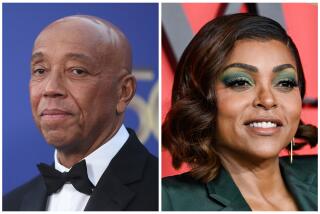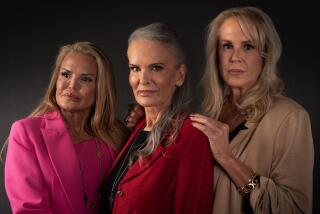NEWS ANALYSIS : Ex-Defendant Puts Self in Role of Victim
- Share via
O.J. Simpson has played many roles during his long career on the public stage--football hero, corporate pitchman and comic actor. In his interview with Black Entertainment Television on Wednesday, he assumed still another part--victim.
How well it will play remains to be determined. Although Simpson was at pains to attribute his misfortune to the media, “disgruntled women,” an indolent district attorney’s office and a “small minority” of dishonest police officers, it was clear that BET and some commentators were eager to make his new role part of what African American scholar Michael Dyson called the “mythic drama” that delineates America’s “sharp racial divide.”
Simpson, by contrast, appeared reluctant to attribute too much of his situation to racial antagonism.
Others were more eager to do so, a reflection of the symbolic freight the Simpson case has carried from the start.
And as the civil suits against Simpson by the families and estates of Nicole Brown Simpson and Ronald Lyle Goldman proceed, the disagreement over what the Simpson legal case signifies seems to deepen. Public opinion polls suggest that many white Americans regard the wrongful death suits as the last opportunity to right the wrong of an inexplicable verdict. Many African Americans, the same polls say, appear to agree with Dyson’s assessment that whites’ refusal to accept Simpson’s acquittal amounts to “a verbal riot,” an exercise in emotional and rhetorical lawlessness.
To writer and journalist John Gregory Dunne, Simpson the man is too weak a reed to carry the weight of a social conversation of such significance. “Right message, wrong messenger,” Dunne said at the conclusion of Wednesday’s interview. “I don’t think this interview had anything to do with the crimes committed. I think it was about race in this country, which is such an important issue you don’t want O.J. Simpson carrying the water for it. The case itself is an issue only for whites; for blacks the issue always is race. And, in fact, race is the most important issue confronting this country, the issue that continues to tear it apart.
“His was a mercantile performance, a promotion for this video and nothing more,” Dunne said.
Nonetheless, UCLA law professor Peter Arenella said he thought the interview and the manner in which BET presented it carried divisive implications. “I think it simply will reconfirm racial divisions, as the half-hour show preceding the interview on BET attempted to do by portraying every significant legal issue in the trial as one that could be reduced to a question of race.”
Veteran civil rights attorney John Burris agreed. “I think it will play differently in the black and white communities. In the white community, where people think he’s guilty, they will think this is a sham. In the black community, which thinks he is innocent, it will strengthen their feelings.”
New York University law professor Derrick Bell, author of “Voices at the Bottom of the Well,” a book about America’s inability to solve racial problems, said “whatever the outcome of the civil trial, it’s going to add to the divisiveness that manifested itself after the jury verdict came down in the criminal case.”
In fact, earlier this week, BET President Jefferi Lee told The Times: “We will not retry him. We want to talk about issues and issues that affect him as a black man in America who has done everything the judiciary has asked him to do and is still being persecuted.”
Writer and social commentator Karen Grigsby Bates noted that Simpson, too, seemed to feel that “people had made their minds up already and that sentiment is reflected in the community I live in. Someone called when I was watching the show and said, ‘I think he might have done it, but I want to buy that video just to upset some white people.’ This is someone who is fully assimilated, has a great job, one of the few black people in her profession, totally rational and still there’s this resentment.”
Grigsby Bates added that “there is a fair amount of dissatisfaction with the mainstream media. The assumption is that the mainstream media always assumed Simpson was guilty and wrote and reported as if he was guilty, buttressed by non-journalists like Jay Leno. There are a lot of O.J. jokes on Leno and the linchpin is that Leno thinks O.J. did it.
“On talk radio, there’s a lot of snickering O.J. jokes. People feel free to say he did it and he got away with it. In the black community, people are looking at that as if white people won’t let it rest. I’ve spoken to a number of black people who felt Simpson, if not directly responsible for the deaths of these two people, at least tangentially had something to do with it. Now though, they’re starting to change their minds because of the vast preponderance of white opinion or white proclivity to express feelings about his guilt, either subtly or not subtly. These are not people who are seeing conspirators under every bed. Some of these are law-and-order black people.”
By contrast, defense attorney Albert De Blanc Jr., like Grigsby Bates an African American, thought “O.J. used the interview to work his public relations in the black community, with talk about all his charity there. But he did not do anything to address the issue we’re all concerned with: whether or not he committed this double murder.”
Opinion was similarly divided over how BET emerged from Wednesday’s exercise. Brenda Shockley, executive director of Community Build, a South-Central Los Angeles community development organization, felt the network “got taken. It was advertised as a no-holds-barred interview and it wasn’t. He knew there was a civil action pending when he agreed to the interview. All he delivered were smiles and handshakes. It was a big tease.”
Writer Joan Didion, who watched the interview in her Manhattan apartment, said: “The most interesting thing to me was that I had never seen this channel, which is a lot more interesting than C-SPAN 2 or 1. I am somebody who can find the Korean video on my cable system, but I did not know where to find BET.”
Grigsby Bates agreed. “One of the most significant things that will come out of this has little to do with Simpson’s situation per se. Lots of Americans have now seen a black network operate competently. I think that may broaden some horizons and soften some stereotypes.”
Popular reaction to Wednesday’s interview mirrored that of many analysts.
At the San Francisco Saloon, a bar and restaurant on Pico Boulevard in West Los Angeles, there were 57 people in the bar. One of them watched Simpson.
There were three TV sets on. One was tuned to Simpson, the other two were tuned into a University of Virginia-Wake Forest basketball game. About a dozen patrons were watching the game.
The rest of the people ignored both sets. At 6:30 p.m., when the Simpson warmup show began, half a dozen people got up from the bar near the set and left.
Wade Brandenberger, 28, who works for a savings and loan, went to watch the basketball game. “I’m just not interested in what he has to say. He hasn’t said anything in the past that was the truth. Why should this be different? I came here to watch the USC-UCLA game.”
At the bar of the Jackie Robinson American Legion Post on Slauson Avenue in the Crenshaw district, about two dozen people debated whether to watch the Simpson interview or the Lakers-Celtics game.
The Simpson partisans won.
Felicia Dennis, a casting director who wanted to watch the basketball game, tried to urge the others to change the channel. “You’ve seen all this, heard it before. He’s got it down pat. I don’t believe in O.J. any more. I’m glad it’s over with.”
But there were Simpson supporters in the crowd as well. Frank L. Porter, 60, said: “He went through the process, the jury found him not guilty. Why should he continue to be harassed?”
At Gagnier’s of New Orleans, a popular restaurant in the Baldwin Hills Crenshaw Plaza mall, bartender Beverly Thompson Jr., 60, said: “Something’s wrong with the sound. I guess the powers that be couldn’t stop the interview, so they just cut out the sound.”
Nancy Lott, a retired flight attendant at Gagnier’s with her husband to celebrate his birthday, said of Simpson, “I never thought he did it, personally. They should leave him alone. . . . He’s a victim, too. And so are his children.”
Times staff writers John Mitchell and Miles Corwin contributed to this article.
More to Read
Sign up for Essential California
The most important California stories and recommendations in your inbox every morning.
You may occasionally receive promotional content from the Los Angeles Times.













